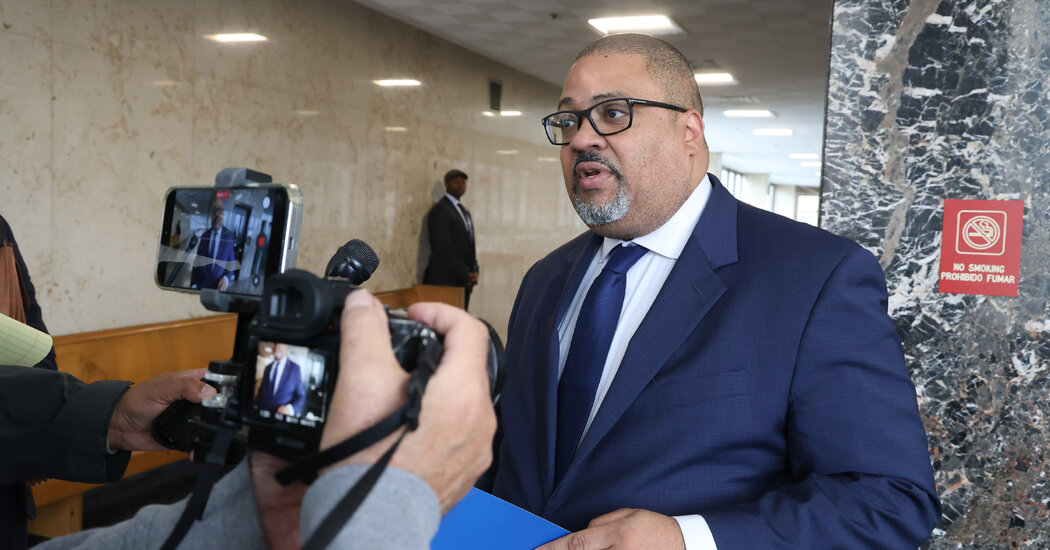Alvin L. Bragg hears it regularly, while canvassing voters or just eating his lunch — a “congratulations” here, a “good job” there. Mr. Bragg listens politely and does not respond.
When Mr. Bragg, the Manhattan district attorney, was speaking to a group of progressive Democrats on the Upper West Side this month, a man in the audience brought it up again: “Congratulations on your success in prosecuting Donald Trump,” he said, before launching into an unrelated question.
Mr. Bragg, attending the event amid his re-election campaign, did not acknowledge the comment.
The case that defines his first term is never spoken of. Last year, Mr. Bragg became the first prosecutor to win a conviction against a president. As a rule, Mr. Bragg does not respond when it is mentioned. Nor does he tout, in his campaign literature, on the stump or anywhere else, the most high-profile conviction in his office’s history. He will not discuss the particulars of the prosecution, instead referring questioners to legal papers. Even those few words of avoidance come grudgingly.
In 2023, Mr. Bragg’s office announced Mr. Trump’s indictment, 34 felony counts that accused him of covering up a hush-money payment to a porn star, meant to head off a scandal in the final days of his 2016 presidential campaign.
The charges instantly fueled a wave of anger from the political right, and the intricate theory underpinning the charges drew skepticism from many in the legal world. At the time, Mr. Bragg, a Democrat, said that his office’s decision to proceed was based solely on “the facts and the law.”
On a recent Sunday afternoon, sitting at a restaurant near the Abyssinian Baptist Church in Harlem, Mr. Bragg again demurred when asked about the prosecution. As a general rule, he said, prosecutors are limited in what they can say about continuing cases, and Mr. Trump’s case is still in appeal.
“I’ll point you to our briefing,” he answered. “I’ll point you to prior public statements.”
Christina Greer, an associate professor of political science at Fordham University, said Mr. Bragg’s reluctance to speak about his victory might frustrate supporters. It’s also, she said, an astute decision in this age of furious presidential retribution.
“With someone like Donald Trump, why would you antagonize him?” she said, adding: “If you win the case, why harp on it?”
During the seven-week trial, Mr. Trump repeatedly attacked Mr. Bragg, and was cited 10 times for violating a gag order with his online postings and comments excoriating jurors or witnesses. But hours after the case’s resolution, Mr. Bragg sent his prosecutors an email thanking them for their work that did not mention the president at all: “I want to assure you that we will do everything in our power to restore normal operations as quickly as possible,” he said.
Others who have confronted the president, either in court or the political arena, have done so with public zeal. As a result, several have ended up as targets of Mr. Trump.
This month, Mr. Trump’s Justice Department indicted New York’s attorney general, Letitia James, who had run on a promise to confront Mr. Trump before winning a civil fraud suit against him in 2024, when he was found liable for conspiring to manipulate his net worth.
This year, Ms. James has never shied from speaking about her lawsuits against Mr. Trump, leading a coalition of attorneys general across the United States who are trying to block the president’s policies.
Mr. Bragg, who is constrained in what he is allowed to discuss about the cases his office handles, has focused his re-election campaign on his office’s work outside the Trump case. He has pointed to his creation of a division called Pathways, which identifies defendants who would benefit from mental health or substance abuse programs more than incarceration, and his emphasis on curbing gun violence, which he says has helped decrease shootings and murders.
He has focused his time, Mr. Bragg said, on doing “the significant enforcement that needs to be done and thinking about how it can be done better.”
“Our body of work speaks for itself,” he said.
In what will be his second general election in November, Mr. Bragg is facing two candidates: the Republican Maud Maron, a conservative activist and self-described former liberal who once worked as a Legal Aid Society lawyer, and an independent candidate, Diana Florence, who is a veteran of the Manhattan district attorney’s office and ran against Mr. Bragg in 2021.
And in a borough where Democrats are 70 percent of registered voters, both candidates are happy to focus their campaigns not on the Trump case, but on the daily operations of the district attorney’s office. Each says Mr. Bragg and his 500 prosecutors have pivoted away from prosecuting routine cases.
And each has made reference to Mr. Bragg’s directive, issued only days into his tenure, that came to be known as the Day One memo, instructing prosecutors to avoid seeking jail time for all but the most serious crimes. After the backlash, Mr. Bragg quickly clarified the policy and said that it was up to each prosecutor to use their discretion.
Ms. Maron said she had decided to run because “we need to get back to the basics of saying we prosecute crime across the board.”
“We don’t say ‘these crimes are off limits,’” she said,
Ms. Florence, who said she had “25 years of experience prosecuting every type of crime imaginable,” said she was taught by Mr. Bragg’s predecessor, Robert M. Morgenthau, to “not over-prosecute, but look at each case individually and prosecute when it’s appropriate.”
Mr. Bragg has rejected the idea that there are office policies directing prosecutors to ignore certain crimes, saying “I became prosecutor in 2003, this is my third office and my fourth stint, and so discretion is infused.”
Mr. Bragg, widely seen as the front-runner in the race, may have little need to invoke his victory over Mr. Trump; both Ms. Florence and Ms. Maron have their vulnerabilities.
As a member of a parent council in one of New York’s largest and wealthiest school districts, Ms. Maron introduced a resolution asking the city’s Department of Education to reconsider letting transgender students play on teams that match their gender identity. The fallout derailed the parent council, and Ms. Maron was voted out over the summer.
Ms. Florence began serving under Mr. Morgenthau, and spent much of her career prosecuting fraud and corruption cases. She resigned after a judge found that she had withheld evidence from defense lawyers in a major bribery case, a serious ethical violation.
For Mr. Bragg, the current re-election campaign has been less contentious than his first run, when he had to fight his way through an eight-way Democratic primary. In recent months, he has spent time attending community meetings, canvassing voters on the weekends and visiting churches.
At more than 200 years old, Abyssinian Baptist has been one of the most influential Black institutions in the country and a powerful force in politics. Mr. Bragg has attended services there since he was a child.
On a recent Sunday, three days after Ms. James was indicted, the message that the Rev. Dr. Kevin R. Johnson delivered from the pulpit was pointed. As male members of the congregation filed to the front for the Men’s Day service, he told the congregation he had called Ms. James.
“I said, ‘We got your back,’” he told the congregation.
As Mr. Johnson spoke, he never made mention of Mr. Bragg. The man who had convicted a president stood quietly next to a grand piano, blending in with the other men in the congregation.
Hurubie Meko is a Times reporter covering criminal justice in New York, with a focus on the Manhattan district attorney’s office and state courts.
The post Alvin Bragg, Seeking Re-election, Is Not Mentioning His Best-Known Case appeared first on New York Times.




